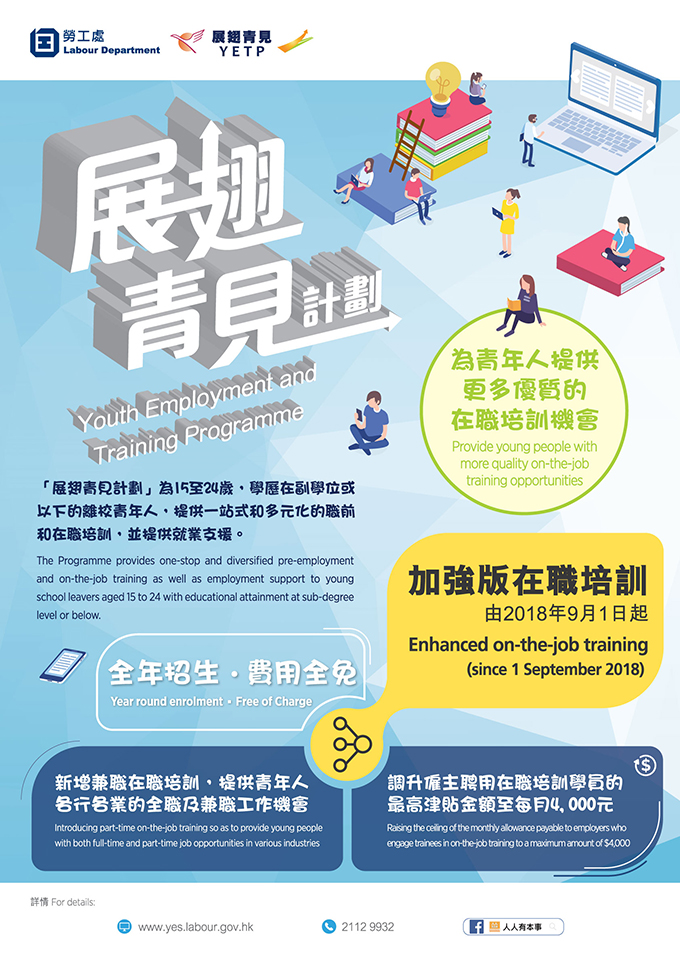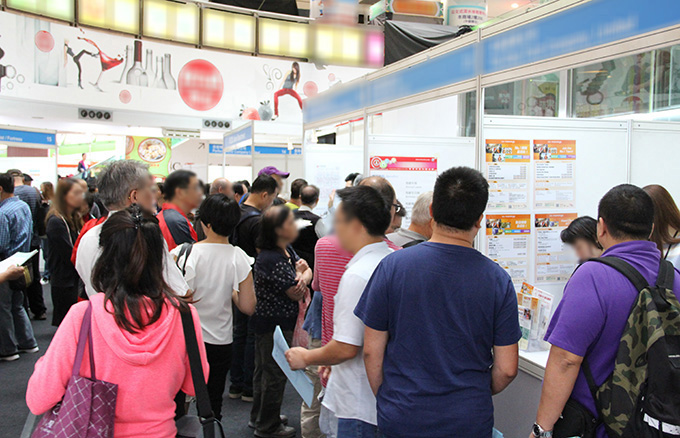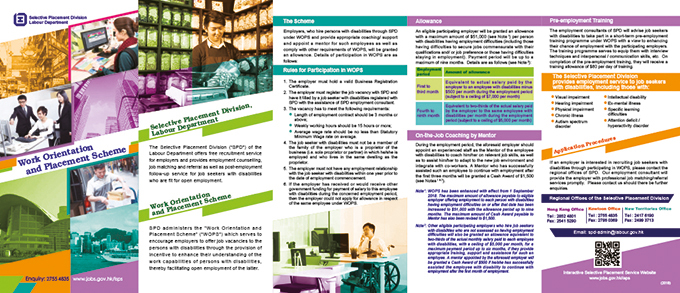Chapter 5 Employment Services
The Programme of Employment Services
www.labour.gov.hk/eng/service/content.htmThe objective of the Employment Services Programme is to provide a comprehensive range of free employment assistance and recruitment services to help job seekers find suitable jobs and employers fill their vacancies. We achieve this by:
- providing user-friendly employment and recruitment services to job seekers and employers;
- offering dedicated employment-related assistance and personalised services to vulnerable groups of unemployed people;
- assisting young people to enhance their employability and advising them on careers choice;
- regulating local employment agencies;
- safeguarding the interests of local employees employed by employers outside Hong Kong to work in other territories; and
- processing applications under the Supplementary Labour Scheme and ensuring employment priority for local workers in filling vacancies under the Scheme.
The principal legislation administered by this programme area includes Part XII of the Employment Ordinance (EO), the Employment Agency Regulations made under the EO and the Contracts for Employment Outside Hong Kong Ordinance (CEOHKO).
Part XII of the EO, together with the Employment Agency Regulations, regulates the operation of employment agencies in Hong Kong through licensing, inspection, investigation and prosecution.
The CEOHKO safeguards the interests of local manual workers and those non-manual employees with monthly wages not exceeding $20,000 who are recruited by employers outside Hong Kong to work in other territories through the attestation of employment contracts for these jobs.
Our Work and Achievements in 2018
Employment Situation in Hong Kong
The labour market tightened further in 2018 on the back of above-trend economic growth, with the annual unemployment rate declining to 2.8%, the lowest level in more than 20 years. For updated statistics on the labour force, unemployment rate and underemployment rate, please visit the webpage: www.censtatd.gov.hk/hkstat/sub/sp200.jsp?tableID=006&ID=0&productType=8.
The Labour Department (LD) recorded a historic high of 1 468 394 vacancies offered by employers of the private sector for free recruitment service in 2018. In the year, a total of 136 079 placements were secured. (Figures 5.1 and 5.2)
A Wider Service Choice
Services Offered at Job Centres
Job seekers can browse vacancies at 13 job centres of the LD and seek referral service provided by the staff or apply to the employers direct. Job seekers may also meet with employment officers who will provide job search advice as well as assist them in matching and finding suitable jobs in accordance with their individual needs and preferences. Various facilities such as digital display system, touchscreen vacancy search terminals, fax machines, toll-free telephones, computers connected to the Internet and resource corners are available for the use by job seekers.
Industry-based Recruitment Centres
The three industry-based recruitment centres of the LD, namely, the Recruitment Centre for the Catering Industry, the Recruitment Centre for the Retail Industry and the Construction Industry Recruitment Centre, provide free as well as one-stop and on-the-spot recruitment services for employers and job seekers, enhancing the efficiency of recruitment and job search.
Telephone Employment Service
Job seekers registered at the LD may call our Telephone Employment Service Centre on 2969 0888 for job referral service. Through conference calls, staff of the Centre can make arrangement for job seekers to talk to employers direct.
On-line Employment Services
The LD’s Interactive Employment Service (iES) website (www.jobs.gov.hk) provides round-the-clock on-line employment services and comprehensive employment information. The iES website is one of the most popular government websites, recording around 202 million page views in 2018. It hosts a number of thematic webpages to provide dedicated employment information for specific clientele. Job seekers can also use the iES mobile application to look for suitable vacancies in the job vacancy database of the LD anytime and anywhere. The mobile application recorded around 145 million hit counts in 2018.
The Higher Education Employment Information e-Platform (www.hee.gov.hk) provides employment support for job seekers with higher education so as to enhance their understanding of the Hong Kong employment market and facilitate them to search and apply for suitable job openings. The e-Platform recorded around 2.28 million page views in 2018.
Central Processing of Job Vacancies
Employers who need to recruit staff can send their vacancy information to our Job Vacancy Processing Centre by fax (2566 3331) or through the Internet (www.jobs.gov.hk). The vacancy information is then disseminated through a network of 13 job centres, three recruitment centres for the catering, retail and construction industries, the iES website and mobile application as well as vacancy search terminals located in various sites throughout the territory after vetting.
Special Recruitment and Promotional Activities
The LD organises a variety of activities to promote our employment services and appeal for vacancies from employers. Job fairs are held to facilitate job seekers and employers to meet and communicate direct. In 2018, we held different kinds of large-scale job fairs to cater for various needs of job seekers and employers from different sectors, including large-scale job fairs in Tuen Mun and Sheung Shui to assist job seekers living in remote areas in securing employment, as well as thematic job fairs assisting ethnic minority and elderly job seekers to find suitable jobs. We also staged job fairs that provided employment and vacancy information on the Mainland to deepen job seekers’ understanding of the employment opportunities on the Mainland and broaden their choices in job search. Moreover, to enhance efficiency of the recruitment process and facilitate placements of job seekers in the vicinity of their residence, district-based job fairs were held at job centres to assist employers to recruit residents in the locality and to enable job seekers to participate in job interviews without having to travel long distance. In the year, 19 large-scale job fairs and 958 district-based job fairs were held, attracting over 53 000 job seekers.
Intensified Services for the Needy
Middle-aged and Elderly Job Seekers
The LD provides dedicated employment services for elderly persons and promote their employment through various means such as setting up special counters at job centres to provide priority registration and job referral service for elderly job seekers, conducting employers’ experience-sharing sessions, and organising employment briefings and job fairs targeted at elderly persons.
In order to further encourage employers to hire job seekers aged 60 or above and provide them with on-the-job training at the initial stage of employment, the LD has enhanced the original Employment Programme for the Middle-aged and renamed it as the Employment Programme for the Elderly and Middle-aged (EPEM) with effect from September 2018. Employers engaging job seekers aged 60 or above who are unemployed or have left the workforce are offered a monthly on-the-job training allowance up to $4,000 per employee for a period of six to 12 months under the EPEM. As for employers engaging each unemployed job seeker aged 40 to 59, the maximum amount of on-the-job training allowance remains at $3,000 per month for a period of three to six months. The EPEM covers both full-time and part-time jobs. In 2018, 2 574 placements eligible for joining the programme were recorded.
New Arrival and Ethnic Minority Job Seekers
The LD provides a comprehensive range of employment services to new arrival and ethnic minority job seekers through job centres. These include employment advisory service, job referral, tailor-made employment briefing and information resources. Those who have difficulties finding jobs are encouraged to participate in various employment programmes to enhance their employability. We also proactively promote our recruitment activities to them so as to speed up their job search.
Since September 2014, the LD has implemented the “Employment Services Ambassador Programme for Ethnic Minorities” to employ trainees of the Youth Employment and Training Programme who can communicate in ethnic minority languages to work as Employment Services Ambassadors at job centres, industry-based recruitment centres and job fairs. Moreover, since May 2017, we have engaged two Employment Assistants proficient in ethnic minority languages at two selected job centres on a pilot basis to strengthen employment support for ethnic minority job seekers, especially those of South Asian origins. Furthermore, large-scale and district-based inclusive job fairs are organised to enhance the employment opportunities of the ethnic minorities.
Work Trial Scheme (WTS)
The WTS seeks to enhance the employability of job seekers who have difficulties in finding jobs. There is no age limit for applicants. During the one-month work-trial without employer-employee relationship, participants take up jobs offered by participating organisations. On completion of the one-month work trial, each participant will receive an allowance of $7,600, of which $500 are contributed by the participating organisation. In 2018, a total of 152 job seekers were placed into work trials.
Workers Affected by Large-scale Retrenchment
In major business closure or redundancy cases, the LD sets up hotlines for enquiry and special counters at job centres to provide special employment services to affected employees. We canvass suitable vacancies from employers to facilitate job search of the affected employees. In addition, under our iES website, a dedicated webpage displays vacancies offered by employers interested in recruiting job seekers who have lost their jobs in recent closure or redundancy exercises. This would help the affected employees find suitable jobs more effectively. In the year, we offered such special employment services to some 300 affected employees.
Job Seekers with Disabilities
Our Selective Placement Division (SPD) offers employment assistance to job seekers with disabilities looking for open employment. Employment consultants provide personalised employment services, including employment counselling, job matching and referral and post-placement follow-up services. In 2018, the SPD registered 2 766 job seekers with disabilities and secured 2 219 placements. (Figure 5.3)
To strengthen the employment support for job seekers with disabilities, the SPD launched a two-year pilot scheme in September 2016 to engage a non-governmental welfare organisation to provide professional psychological and emotional counselling service to job seekers with disabilities in need of this service. In view of the positive response, upon the completion of the two-year pilot, the counselling service has been regularised and named “Counselling Scheme for People with Disabilities” with effect from September 2018.
Work Orientation and Placement Scheme (WOPS)
The WOPS facilitates open employment of persons with disabilities by encouraging employers to engage persons with disabilities and render them with coaching and support through the provision of an allowance. To further promote the employment of persons with disabilities who have employment difficulties and assist them in settling in new posts, the WOPS has been enhanced since September 2018 by extending the work adaptation period (WAP) from two months to three months. The ceiling of monthly allowance has also been raised from $5,500 to $7,000 during the three-month WAP and from $4,000 to $5,000 for the ensuing six months. With this enhancement, the maximum period within which allowance is payable has been extended from eight to nine months, with maximum allowance payable to employers increased by $16,000 to a total of $51,000 for engaging each person with disabilities having employment difficulties. In 2018, 796 placements were secured through the scheme.
Self Help Integrated Placement Service (SHIPS)
The SHIPS aims at improving the job searching skills of job seekers with disabilities and encouraging them to be more proactive in job hunt, thereby enhancing their employment opportunities. In 2018, 307 job seekers with disabilities participated in the programme.
Interactive Selective Placement Service (iSPS) Website
The iSPS website (www.jobs.gov.hk/isps) provides employment services for job seekers with disabilities and employers. The website enables persons with disabilities to register with the SPD, browse job vacancy information and perform preliminary job matching. It also enables employers to place vacancy orders, identify suitable job seekers with disabilities to fill their vacancies and request the SPD to refer candidates to them for selection interview. The website facilitates employers to browse information on the work capacity of persons with disabilities more readily. At the same time, it helps persons with disabilities access various on-line employment services and other related support services.
Promotional Activities
To enhance public understanding of the work abilities of persons with disabilities as well as to publicise the services of the SPD and the WOPS, the SPD conducted a series of promotional activities, such as staging of exhibitions, production of publications and advertisements, broadcast of promotional videos, publicising promotional messages through newspapers, publications of employers’ associations, radio and television channels, public transport network, wall banners and mobile application advertisements, etc. during the year. In addition, a large-scale seminar was held for employers and human resources practitioners. Promotional visits were paid to employers of different trades and publicity materials were sent to them to canvass job vacancies for persons with disabilities.
Work Incentive Transport Subsidy (WITS) Scheme
The territory-wide WITS Scheme helps low-income earners reduce their cost of travelling to and from work to encourage them to secure or stay in employment. Qualified applicants may receive monthly subsidy of $600 (or $300 at half-rate). Up to the end of 2018, a total of 125 718 applicants received subsidies totalling $1,935 million. The household-based application arrangement of the scheme was abolished in April 2018 upon the implementation of the Working Family Allowance Scheme.
Services for Young People
Youth Employment and Training Programme (YETP)
To enhance the employability of young people, the LD administers the YETP, a "through-train" programme providing seamless and comprehensive training and employment support to young school leavers aged 15 to 24 with educational attainment at sub-degree level or below.
Trainees can enrol on a year-round basis and are entitled to a full range of coordinated and customised training and employment support services, including pre-employment training, one-month workplace attachment training, on-the-job training of six to 12 months, reimbursement of off-the-job course and examination fees up to $4,000 per trainee, as well as case management services rendered by registered social workers.
To encourage employers to hire young people and provide them with quality on-the-job training, the LD expanded the scope of the YETP to cover part-time posts and increased the maximum amount of monthly training allowance with effect from September 2018. The maximum monthly training allowance payable to employers who engage each trainee to undertake on-the-job training has been increased from $3,000 to $4,000 for a period of six to 12 months.
In the 2017/18 programme year running from September 2017 to August 2018, 2 100 young people attended pre-employment training and 2 264 trainees were placed into on-the-job training vacancies under the YETP.
The YETP closely collaborates with training bodies and individual employers or employers of specific sectors to launch special employment projects, providing tailor-made pre-employment training and on-the-job training for young people. In the 2017/18 programme year, 63 special employment projects were launched, involving employers in the aviation, healthcare, logistics, personal and business services as well as property management industries, etc.
In August, the LD co-organised the Award Ceremony of the YETP Most Improved Trainees cum “Solar Project 2018 – Dream Journey with YETP” concert with Radio 2 of Radio Television Hong Kong. The event showcased the creditable improvements of trainees after joining the YETP and commended the caring efforts of training bodies and employers. Trainees’ successful experience constituted the best encouragement to their peers. It was also a sterling testimony to the achievements of trainees, training bodies, employers and the Government in nurturing the development of the younger generation. In the year, we also introduced new posters and animated videos to publicise the enhancements to on-the-job training under the YETP.


Programme for Youths with Acute Employment Difficulties
To strengthen the employment support for vulnerable youths, the YETP continued to operate the “Career Kick Start” project in 2018 to offer on-the-job training of 12 months’ duration to young people with special needs through placements in non-governmental organisations (NGOs), so as to enhance their employability. Participating NGOs are encouraged to assist trainees in securing full-time jobs in the open employment market through the provision of “Placement Incentive”.
Youth Employment Support
The LD operates two youth employment resource centres named Youth Employment Start (Y.E.S.). The two centres provide personalised advisory and support services on employment and self-employment to young people aged between 15 and 29 to facilitate them to map out their career path, enhance their employability and support them to pursue self-employment. Services provided include career assessment, career guidance, professional counselling, value-adding training, self-employment support as well as up-to-date labour market information. In 2018, the number of services provided to young people by the two centres totalled 72 899.
Working Holiday Scheme (WHS)
Since 2001, Hong Kong has established bilateral WHS arrangements with a total of 13 economies, including New Zealand, Australia, Ireland, Germany, Japan, Canada, Korea, France, the United Kingdom (UK), Austria, Hungary, Sweden and the Netherlands. The WHS aims to provide an opportunity for our youths aged between 18 and 30 to enrich their global exposure and broaden their horizons, by experiencing foreign culture through living and working temporarily overseas while holidaymaking. At the same time, the WHS allows youths of our partner economies to learn more about Hong Kong.
Save for the UK which allows our youths to stay for up to 24 months, the remaining 12 partners issue working holiday visas to eligible Hong Kong youths to stay in their economies for up to 12 months for holidaying and taking up short-term employment to subsidise their expenses, and/or studying short-term courses (except for Ireland).
These WHSs have been well received. As of end-2018, about 90 000 Hong Kong youths participated in the WHS. The LD will continue to enhance the publicity of the WHS and explore with more economies to establish new WHS arrangements or seek to expand our existing bilateral arrangements in order to provide more choices and opportunities for our youths to participate in the WHS.
Regulating Local Employment Agencies and Employment outside Hong Kong
The LD regulates employment agencies in Hong Kong through licensing, inspections and complaint investigation. In 2018, we issued 3 079 employment agency licences and revoked or refused to issue/renew 11 licences. As at the end of 2018, there were 3 079 licensed employment agencies in Hong Kong. A total of 2 019 inspections were made to employment agencies in the year.
In 2018, we amended the legislation to strengthen the regulation of employment agencies. The Employment (Amendment) Ordinance 2018, which came into effect on 9 February, has substantially raised the penalties for employment agencies overcharging job seekers commission and operating without a licence from a maximum fine of $50,000 to a maximum fine of $350,000 and imprisonment for three years and extended the statutory time limit for prosecution of these two offences from six to 12 months; widened the scope of the overcharging offence to include (in addition to the licensee) the management as well as persons employed by employment agencies; provided new grounds for the Commissioner for Labour to consider refusing to issue/renew or revoking an employment agency licence; and given the Code of Practice for Employment Agencies (the Code) a legal status.
In April, we launched an on-line form on the Employment Agencies Portal (www.eaa.labour.gov.hk) to facilitate employers and job seekers to lodge complaints and provide information on suspected contravention of law or non-compliance with the Code. To enhance transparency of information about employment agencies, since October, we have been publishing on the Employment Agencies Portal in a systematic manner the records of conviction of the offences of overcharging and unlicensed operation, revocation or refusal of renewal of licence and written warnings issued for non-compliance with the Code, so as to assist members of the public in making informed decisions when engaging employment agencies. The enhanced transparency would also help foster the adoption of good practices by the industry.
The LD also safeguards the interests of local employees engaged by employers outside Hong Kong to work in other territories by attesting all employment contracts entered into in Hong Kong involving manual employees and non-manual employees with monthly wages not exceeding $20,000.
Regulating Labour Importation
Supplementary Labour Scheme (SLS)
The LD administers the SLS which operates on the principles of ensuring the employment priority for local workers while allowing employers with proven local recruitment difficulties to import workers at technician level or below.
We provide active job matching and referral services for local job seekers to ensure their employment priority. Vacancies under the SLS are widely publicised. Local workers can attend tailor-made retraining courses, if appropriate, to better equip themselves to fill the vacancies. Applications from employers who have set restrictive and unreasonable job requirements or who have no sincerity in employing local workers will be rejected.
As at the end of 2018, there were 5 298 imported workers working in Hong Kong under the SLS.
Policy on Foreign Domestic Helpers (FDHs)
The FDHs have been admitted to work in Hong Kong since the 1970s. Apart from enjoying the same statutory rights and benefits as all employees in Hong Kong, the FDHs are further protected by a Government-prescribed Standard Employment Contract, which stipulates that the employer has to provide to the FDH free accommodation with reasonable privacy, free food (or food allowance in lieu), free passage to and from the FDH’s place of origin and free medical treatment, etc. The FDHs also enjoy wage protection through the Government-prescribed Minimum Allowable Wage (MAW), under which employers have to pay the FDHs a salary no less than the prevailing MAW when the contracts are signed. The Government attaches great importance to safeguarding the FDHs’ statutory and contractual rights. The LD spares no efforts in investigating suspected offence cases and prosecution action will be taken out if there is sufficient evidence.
In order to strengthen the protection of the FDHs and enhance their awareness of their rights and benefits, the LD continued to organise a host of publicity and educational activities and maintained close liaison with the governments of the FDH source countries and their consulates-general in Hong Kong, NGOs serving the FDHs and the FDH employer groups to discuss matters related to furthering the protection of the FDHs.
Apart from the ongoing publicity and educational activities, we published in 2018 a new guide to employers of the FDHs to provide information on their rights and obligations, and a newsletter to introduce the LD’s services and support channels. We also organised briefings for newly-arrived FDHs and first-time employers to raise the awareness of their respective rights and obligations.
The FDH Portal (www.fdh.labour.gov.hk) of the LD is available in 10 FDH native languages in addition to English and Chinese, making 12 languages in total. This one-stop on-line platform facilitates the FDHs to understand their rights and benefits before coming to work in Hong Kong. Since April 2018, a new on-line form and a dedicated email account (fdh-enquiry@labour.gov.hk) have been made available on the FDH Portal to facilitate the FDHs and employers to make enquiries and complaints. Furthermore, we launched on 19 December a dedicated 24-hour hotline to provide one-stop support for the FDHs in making enquiries and seeking advice on their employment rights and obligations. In addition to Cantonese, English and Putonghua, interpretation service in seven FDH native languages (namely Tagalog, Bahasa Indonesia, Thai, Nepali, Hindi, Punjabi and Urdu) was provided.
As at the end of 2018, there were 386 075 FDHs in Hong Kong, with 54.6% coming from the Philippines and 43.0% from Indonesia.

